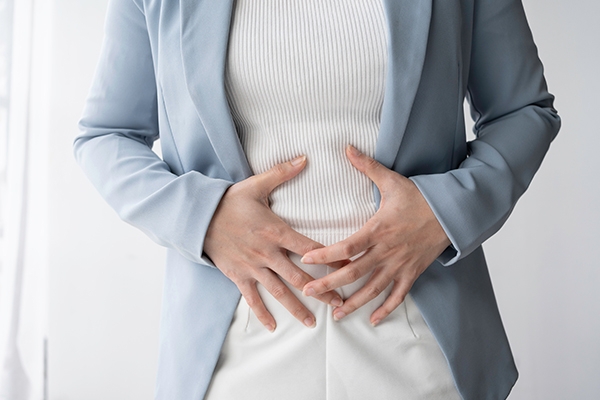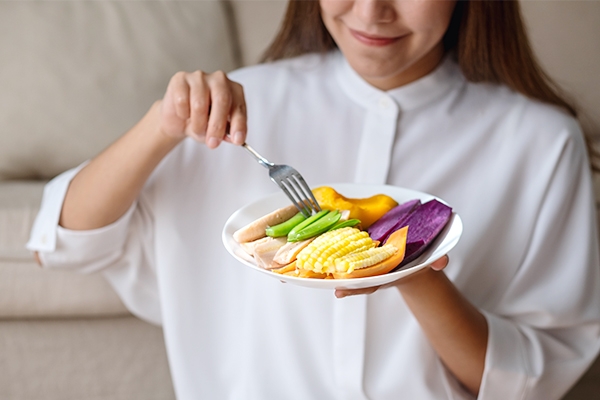Why is My Stomach Bloated?

Dinar loves vegetable salad. However, she always feels bloated after eating it. What do you think they might be? Let's find out!
A bloated stomach usually feels tight, full, and uncomfortable. This symptom is often accompanied by belching, excess gas, or a rumbling stomach. Although this condition is generally related to digestive problems, it can also be caused by hormones, stress, or certain medical conditions.
Bloating usually goes away on its own. However, in some people, it can recur.
What causes it?

The most common cause of stomach pain and bloating is excess gas. If you feel bloated after eating, it may be due to a digestive issue. Menstrual cycles can also cause temporary bloating.
1. Gas
A buildup of gas in the stomach and intestines is one of the most common causes of bloating. The average body produces 1-3 liters of gas and farts about 10-14 times a day.
Gas typically gets trapped in the digestive tract in two ways: it is swallowed while talking and eating, and it is produced in the intestines by bacteria during digestion and fermentation.
Common symptoms of excess gas include:
- frequent belching;
- nausea or sudden bowel movements;
- A feeling like something is trapped in the stomach.
The most common causes of excess gas include:
- soda, milk, beans, cauliflower, broccoli, and cabbage;
- eating too quickly or chewing gum;
- stomach infections;
- chronic illnesses, such as celiac disease or irritable bowel syndrome.
2. Dyspepsia
This disorder often causes bloating accompanied by discomfort or pain in the stomach (dyspepsia).
Causes include
- eating too much;
- excessive alcohol consumption;
- taking medications, such as ibuprofen.
3. Stomach infection
A stomach infection can cause bloating as well as diarrhea, vomiting, nausea, and stomach pain.
The cause is bacteria, such as Escherichia coli or Helicobacter pylori—or a viral infection, such as norovirus or rotavirus.
4. Fluid retention
Salty foods, changes in hormone levels, and food intolerances can cause the body to retain more fluid. Some women experience bloating just before their period or in early pregnancy.
Chronic bloating can lead to serious illnesses, such as liver or kidney failure and diabetes.
5. Food intolerance
Some people get bloated after eating certain foods like lactose, gluten, and coffee or tea. Lactose intolerance causes bloating, which will improve after digestion.
6. Chronic digestive disorders
Chronic digestive disorders, such as inflammatory bowel disease and irritable bowel syndrome, can make it difficult for the body to digest food. Symptoms often include excess gas and a bloated stomach after eating.
Other symptoms may include diarrhea or constipation, nausea, vomiting, fever, bleeding, anemia, and unexplained weight loss.
7. Gastroparesis
Gastroparesis is a disorder that occurs due to delayed gastric emptying due to disorders of the muscles or nerves that control the digestive process.
As a result, food passes through the stomach and intestines much more slowly. This disorder causes nausea, bloating, feeling full quickly, and constipation.
Diabetes, hypothyroidism, and certain gastrointestinal surgeries can sometimes cause gastroparesis.
8. Gynecological disorders
Bloating can caused by a variety of gynecological issues, including monthly menstruation or hormonal changes during menopause.
Bloating, cramps, and abdominal pain can also be caused by endometriosis, which occurs when the uterine lining joins the stomach or intestine.
9. Constipation
Bloating occurs when food contents build up in the intestines. Constipation can be caused by dehydration, food intolerances, pregnancy, intestinal disorders, nutritional deficiencies, or taking certain medications.
How to reduce bloating?

Do
- Exercise regularly to improve digestion.
- Chew your meal with your mouth closed to avoid swallowing air.
- Drink enough water.
- Eat high-fiber foods if you are constipated.
- Eat smaller meals more often.
- Gently massage your abdomen from right to left to release trapped air.
Don’t
- Drink soda, alcohol, coffee, or tea.
- Eat gas-producing foods, such as cabbage, beans, or lentils.
- Eat heavy meals before bed.
- Consume processed, sugary, spicy, or fatty foods.
- Eat foods you know you have an intolerance to.
Bloating is common. Bloating is common. However, if the symptoms are severe or remain for an extended period, visit GWS Medika Clinic, a health clinic in Jakarta, for consultation.



